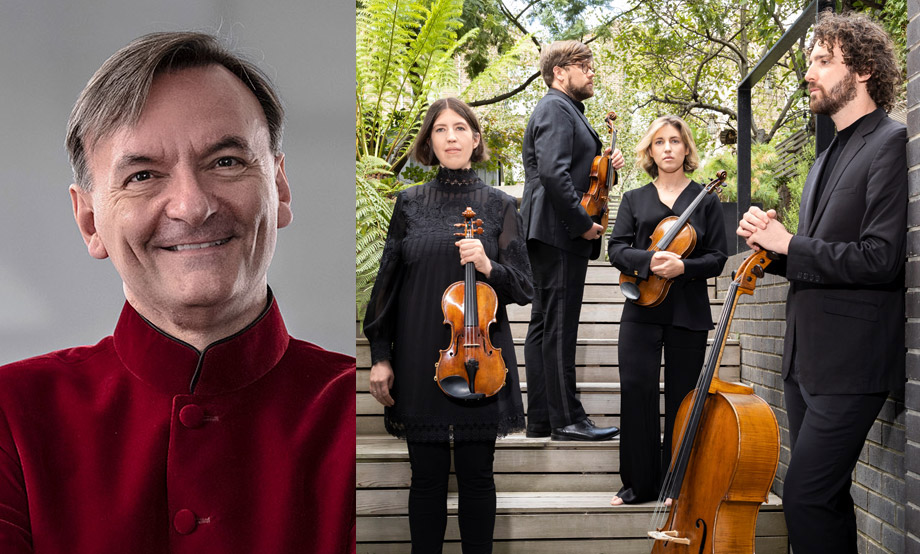
Rencontre magique
by/di Pamela Goldman (traduzione in italiano al fondo pagina)
On March 8th, 2024, the collaboration of the Castalian String Quartet and composer, pianist Sir Stephen Hough was certainly stellar, everyone in the performance hall could feel the radiance and a standing ovation with cheers, certainly apropos. In NYC at the 92 Y, the evening’s program consisted of Haydn’s String Quartet in A Major, Op. 20, no. 6 (1732-1809), followed by an original string quartet, no. 1, Les six rencontres, composed by Sir Stephen Hough (b. 1961-) and finally Brahms (1833-1897), Quintet for piano and strings in F minor, Op. 34.
Ensconced between the masterworks of Haydn and Brahms, the jewel of the evening was the original work by Sir Stephen Hough. His accolades are many, including being the first classical performer to be given a MacArthur Fellowship for ‘genius’ as well as being knighted for his ‘services to music’ from his British-born country. His gifts have led to commissions all over the world, several being the Musée du Louvre and Westminster Abbey. He is a writer, composer and pianist extraordinaire who is also on the faculty of Juilliard and several other honorable institutions.
Exciting and provocative, Hough’s piece, Les Six rencontres was inspired by Les Six, six famous French composers most active between the two world wars, and the chamber music of Ravel and Dutilleux. The chosen title for the piece also represents the six movements of the composer’s design, each having a unique musical dialogue in response to the Great War. There are hints of the 1920’s seduction and energy as well as touches of the absurd, almost a new way of dealing with the devastation of war and its unfathomable tragedy.
The piece is a window to the collective conscious of war-torn Europe with mood variations from upbeat, weird and strange to playful, gregarious, high-spirited, ‘Mozart-on-speed’ in style. It’s ironic and flippant in style and responds to the war-torn world with a rebellious effervescence.
The collaboration with the Castalian String Quartet was exceptional. British based, they were the recipient in 2019 of the Royal Philharmonic Society’s Young Artist Award and hold an inaugural Hans Keller String Quartet-in-Residence at Oxford University’s faculty of music. Their name is derived from the ancient Greek myth of Castalia. Castalia was a nymph who metamorphosed herself into a fountain to throw of Apollo’s pursuit of her. According to the myth, one can drink from this fountain in ancient Delphi, for poetic and artistic inspiration.
This performance was truly an indicator that music marches to its own beat and the genius of Sir Hough during these uncertain times, exemplifies humanity prevailing when the future is so uncertain.
°*°*
Traduzione in italiano
di Simona Maria Frigerio
L’8 marzo 2024, la collaborazione tra il Castalian String Quartet e il compositore e pianista, Sir Stephen Hough, si è rivelata decisamente stellare: ogni spettatore in sala ha potuto avvertire un tale splendore da tributare alla performance una autentica standing ovation. Al 92nd Y, NYC, il programma della soirée ha presentato il Quartetto per archi in Do Maggiore, Op. 20, no. 6, di Haydn (1732-1809), seguito da un quartetto originale, sempre per archi, intitolato Les six rencontres, no. 1, composto da Sir Stephen Hough (classe 1961) e, come gran finale, il Quintetto per piano e archi in Fa minore, Op. 34, di Brahms (1833-1897).
Posizionata tra i capolavori di Haydn e Brahms, l’autentica gemma della serata si è rivelata essere il brano originale di Sir Stephen Hough – compositore che ha collezionato, negli anni, vari riconoscimenti, incluso l’essere stato il primo performer di musica classica a ottenere la MacArthur Fellowship per la propria ‘genialità’, così come il titolo di baronetto per i ‘servizi resi alla musica’ da parte del Regno Unito, suo Paese natale. I suoi talenti lo hanno portato a ottenere incarichi in ogni parte del mondo, dal Musée du Louvre a Westminster Abbey. Scrittore, compositore e pianista straordinario, insegna altresì alla Juilliard e in molte altre celebri istituzioni.
Eccitante e provocante, il brano di Hough, intitolato Les Six rencontres si ispira a Les Six, ossia a sei compositori francesi attivi tra le due guerre mondiali, e alla musica da camera di Ravel e Dutilleux. Il titolo rimanda altresì ai sei movimenti predisposti dal compositore, ciascuno un dialogo musicale unico in risposta alla Grande Guerra. Vi si avvertono suggestioni della seduzione e dell’energia degli anni 20 così come un tocco di assurdo, quasi un nuovo modo di reagire nei confronti della devastazione della guerra e della sua incommensurabile tragedia.
Il brano è una finestra aperta sulla coscienza di un’Europa devastata dalla guerra con variazioni di atmosfera – dal ritmato, bizzarro e insolito al giocoso, socievole e brioso, in uno stile che potremmo definire ‘alla velocità di Mozart’. Ironico e impertinente, risponde a un mondo devastato dalla guerra con ribelle effervescenza.
La collaborazione con il Castalian String Quartet si è rivelata eccezionale – come scrivevamo. Di base nel Regno Unito, il quartetto ha ricevuto, nel 2019, il Premio come Giovani Artisti dalla Royal Philharmonic Society e ha tenuto l’inaugurale Hans Keller String Quartet-in-Residence alla facoltà di musica della Oxford University. Il nome del gruppo deriva dal mito greco di Castalia, una ninfa che si gettò nella fonte del Monte Parnaso per sfuggire ad Apollo. Secondo il mito classico, occorreva bere da detta fonte, nell’antica Delfi, per ottenere l’ispirazione poetica e artistica.
La performance è stato un segnale che la musica segue il proprio ritmo e il genio di Sir Hough, in questi tempi incerti, è un esempio che dimostra come l’umanità può prevalere anche quando il futuro è così incerto.
Friday, March 15, 2024 / venerdì, 15 marzo 2024
On the cover: Pianist Stephen Hough and the Castalian String Quartet / In copertina: il pianista Stephen Hough e il Castalian String Quartet (foto pubblicitaria online)







